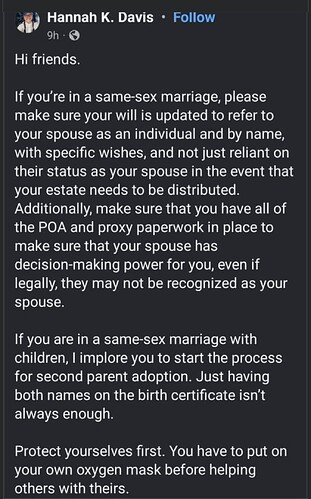When I read that one I immediately jumped to California and the recent law against living while houseless.
Or the pretend progressives who exclude trans people
Ah, okay thanks. Yes, I hope that’s how most readers interpret it.
It’s a double bind. Impossible to do #5 and #7 together.
(reposting since this is the more appropriate thread.)
This just occurred to me. If you have any durable medical equipment that may need to be replaced in the next two years, see about replacing it now.
I always have a buffer for my meds. The refills are ready for pickup weeks before I run out. This could be critical if there are issues with supply chains
Really good point, @Kii. Even things that are ostensibly made in the US or North America might have significant materials or sub components made elsewhere. Some things have gotten better in that regard since the big disruptions from COVID, but things like drugs & medical devices that have long & expensive approval timelines haven’t fully caught up to that.
Department of perhaps good to know:
tl;dr: Police are upset about iPhones rebooting themselves in lockup because it makes them much harder to break into. It seems that if you unlock your iPhone, then relock it, they have tools that can crack it, but not if it’s a fresh boot.
The police have interesting theories about this. ![]()
If the iPhone was in an After First Unlock (AFU) state, the device returns to a Before First Unlock (BFU) state after the reboot. This can be very detrimental to the acquisition of digital evidence from devices that are not supported in any state outside of AFU.
The take-away: If you think your iPhone could be seized, it has data that must be protected, and there’s time, reboot it rather than just locking it. (Warning: this could result in a contempt of police charge, especially in a jurisdiction where they don’t need a warrant to order someone to unlock it.) Alternately, reboot it before entering a possible situation.
I have no idea if Android phones have a similar issue.
With an incoming administration adversarial to those most at risk from location tracking using tools like Locate X, the time is ripe to bolster our digital defenses. Now more than ever, attorneys general in states hostile to reproductive choice will be emboldened to use every tool at their disposal to incriminate those exerting their bodily autonomy. Locate X is a powerful tool they can use to do this. So here are some timely tips to help protect your location privacy.
I haven’t read these yet, but some might be useful:
Today I went to my county’s Democratic business meeting. I think that getting more involved with the political process can be a kind of survival strategy. From what I heard, it’s clear that they lost votes in parts of my county where they did not have a strong ground game due to there being a safe seat. And if you do get involved, you can push for support for people who are going to be targeted at your local level, at the very least if the party won’t/can’t do something like mutual aid, you can find people interested to build up networks.
A will should never refer to your spouse as “spouse.” At the most it should be “spouse [name].”
If you have a will that doesn’t refer to all people by their full legal name the first time they are mentioned (and ideally their relationship to you) and then always by first and last name throughout, you need a new attorney to draft your will.
Straight couples should also have POA paperwork. Critical for queer couples but being straight is not enough protection.
A will is a priority for anyone who has minor children.
If you cannot afford to get an attorney to draft a will, check your state bar associations website for clinics that offer services for free or at reduced rates. Check with your local LGBTQIA organizations and see if they know of anyone offering will drafting at reduced rates. You can also research your state laws on holographic wills. These are handwritten wills and the laws on them vary by state.
Since after a reboot I have to use both my security pattern and biometrics, I think there is definitely a difference between the two on Android as well
Yeppers! Fortunately, I am somewhat armed with knowledge of “how to get by when you got very little”. Some of it was imparted by my parents from their experiences in the GD, and a lot of it is from books. I’m not quite at this point: Interviewer (paraphrased): So, you would pick mushrooms. How do you know if their poisonous? Truman: Your grandmother has to tell you. But my dad was big into woodlore - probably from the camp he went to when he was 13 or 14. I still have the little booklets showing how to identify trees and flowers and the first paperback ed. of the Mother Earth News Almanac (1973). The latter has some great ideas for living off the land and making use of what can be cheaply obtained, though the prices for say, an old bread truck to be turned into a camper, have definitely risen since then.
Also a Foxfire book, Foxfire 2. It’s a record of students, older teens I think, who went to the Appalachian Mountains and interviewed the folks that lived in the hollar and such and learned their histories and how to turn a stump into a beehive, weave a mattress supporter from ropes, build a large weaving room, et al.
And @mindysan33, were Hoover’s policies partly supported by the big interests? And If you don’t have a short answer, could you recommend and books/essays that go into more than the “Black Friday 1929/stockbrokers leaping out of windows” aspect. Or was it just stock manipulation? I’m surprised I’ve not read more about that, y’know?
I think they did… he was their guy when he got elected, after all, and he did not see a reason to make sweeping changes, since the markets/economy had always had that kind of volatility. The core expectation of the business world was that these kinds of crashes were fine, as they cleaned out the system of “poor performers”… Never mind the actual human misery it caused everyone else…
I’ll get back to you on a book or article.
I do know that he was a geologist/mining engineer, and that Truman contacted him to help with starting what would be called the Marshall Plan. I’ve always had the feeling he was somewhat of a scapegoat, as the POTUS always is when times are bad…except for #47.
I don’t think he was a scapegoat, in that he legitimately felt like the government shouldn’t have a role in helping the public during the depression and that in general government intervention was not a great idea. And then he called the army on the Bonus army marchers when they came to DC to demand their pensions early.
I do know he had been popular in part due to his work organizing famine relief in Soviet Union… Americans saw him as a smart, kind person. But that changed when all he really did when the depression started was to ask business leaders not to fire people and to help organize relief efforts. Which, they didn’t do that, because it wasn’t in their business interests. I don’t think his lack of action was out of cruelty or not caring about the public, but out of an ideology that understood these sorts of crashes as “natural forces” that needed to play out… That’s BS, of course, but it was pretty mainstream thinking among business elites.
I’m not surprised he was asked for help on the Marshall plan, as it seems like organizing big projects was totally in his wheel house…
So you could start with his archives:
I think if you poke around, you’ll likely find a bibliography of scholarly essays and books about his life and/or presidency…
Or check the bibliography of this chapter from American Yawp to see what they have on Hoover (scroll to the bottom to find that):
http://www.americanyawp.com/text/23-the-great-depression/
This is the textbook I use for my classes.
Thanks! And the scapegoat idea occurred to me when I thought of the Hoovervilles of the GD.
Oh yeah, I’m totally fine with the 4B movement.
It’s a little like this very forum, isn’t it? You and I were living the lifestyle for years, and now all of a sudden here are a whole bunch of people who’ve just discovered this option and are eagerly joining the group!
Frank Conniff posted something about Trump on Instagram today. He’s quite political. Also, he has a new cat.
Anyway, here are a couple of comments made to that post:
It is very clear what they are suggesting.
Are they agents provocateurs? Who knows? Instagram is so full of fake accounts.
I just want to remind people to be careful of what they write and what they ![]() out there on the wider internet. Trump has vowed revenge against “enemies from within,” and social media has proven itself to be a great way to collect information on people.
out there on the wider internet. Trump has vowed revenge against “enemies from within,” and social media has proven itself to be a great way to collect information on people.

